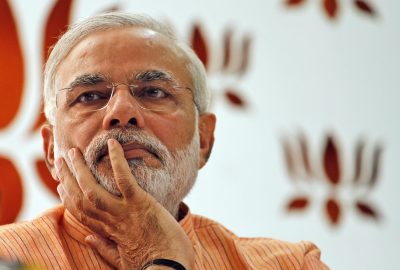By
Ratnesh Dwivedi
It’s been close to two years and the Modi Administration has already started feeling the heat; Ram Mandir, Jat Reservation, ‘flip flop’ Policy on Pakistan, criticism by the opposition, challenge to sustain a smooth GDP and many more.
Narendra Modi came into power when India was depressed due to multiple corruption cases within government and gave hope to billions of Indians with his Sabka Saath, Sabka Vikas agenda. Wisely the government avoided hard liners on Nationalist agendas like building a Ram Temple in Ayodhya. Modi’s achievements on the global platform and his acceptance by the West put a strong image of India before the world, but India remained tense on the home front. His conversion of the Look East Policy into the Act East Policy was also widely accepted but the government did not come with any clear-cut policy on China’s ambitious Maritime Silk Route Trade and on Pakistan.
In this time, when India has become a global center of hope for the economy, that too in a time when China’s economy is reeling, let us see what are the seven big challenges before Modi’s India in the next couple of years, before the country starts planning for the next general elections:
1). Turbulences on the Home Front
Ram Mandir, Jat Reservation, minority issues, hardliners within the party, cultural identity, home grown terrorism, the Kashmir issue, will be a few issues which will keep troubling the Modi administration for the next couple of years and his Home Minister needs to identify a clear vision and strict policy on these issues. Modi has a thumping majority in the lower house and that is where he can derive confidence to make tough decisions on the home front. That is what is needed to make India strong at home.
2). Pakistan
It is true that Pakistan has been and will keep troubling India, the reason for this being that even if the Pakistani government wants to have good relation with India, certain establishments within Pakistan will never want to improve relations with India. The reason for this is that their survival depends on Anti India sentiment. In the next couple of years Modi’s External Affairs Minister needs to derive a clear cut policy towards Pakistan. They have to be strong enough to decide whether to talk with Pakistan or isolate them on the international platform.
3). China
China has ambitious plans. It wants to revive the Maritime Silk Route by the means of which it desires to dominate in Asia, as it realizes that by doing so it can dominate the USA. That’s why it wants to partner or rather gain the approval of India on the Maritime Silk Route. China will never like to engage with India in a military discourse, rather it will always see India as a dumping yard for its cheap goods. It has succeeded in it by overshadowing branded companies in the sector of IT and other retail goods. China is doing what western companies want to do through FDI. India needs to unearth its relation with China very carefully in the coming years.
4). India – a Hope for Global Economy
When the world economy is facing a turbulent time and China’s economy is reeling, India presents a bright spot in the global economy. Many western experts like Christian Legarde believe that India has the potential to show the world a path. Its golden spot is for foreign investments. Aruna Jaitely has presented a people’s budget in 2016 and Modi is determined to set Made in India as a benchmark for Indian products. In such a time India is a hope for the global economy. No one dares to believe that the Indian economy will boost multifold, but in the next few years will either remain static or will improve.
5). Education
Education is one thing which makes a backbone for any developing country. This is only education which, if assured to all, can change the impossible into the possible. Education brings jobs, boosts economy and is also a source of health, wealth and peace. Many of the world’s problems today are due to a lack of education, which also includes terrorism where many countries are investing a lot of time and money to fight with it. Ensuring education to all will be the top challenge for the Modi Administration over the next few years. The government has to find a reason as to why none of the Indian Universities have been able to make it to the top 100 Universities in the world.
6). Poverty
India has been facing this challenge since it was liberated from British rule and still India’s large population is living below the poverty line. Despite multiple efforts of many governments India is still facing this huge challenge to give ‘Roti, Kapda aur Makan’ (Bread, Cloth and House) to every Indian. Eradicating poverty has been Mahatma Gandhi’s dream but not a single remarkable effort has been made in this direction. The Prime Minister Modi-led BJP came into power with the very famous slogan ‘Sabka Saath, Sabka Vikas’(Inclusion of all in development of All) and the government still need to look for a clear strategy to help the poor.
7). Modi Brand
It is true that a Chief Minister of the wealthiest state of India, who was banned by the west, is now accepted by each country with due respect and recognition to the extent that Narendra Modi has now become a ‘Global Brand’. Prime Minister Modi needs to encash this brand for India and also to sustain it for future years. The last couple of months have given a major jolt to the Modi Brand but it’s still one of the top brands among the global political circuit. Modi needs to sustain it for all his initiatives.



No Comments Yet!
You can be first to comment this post!